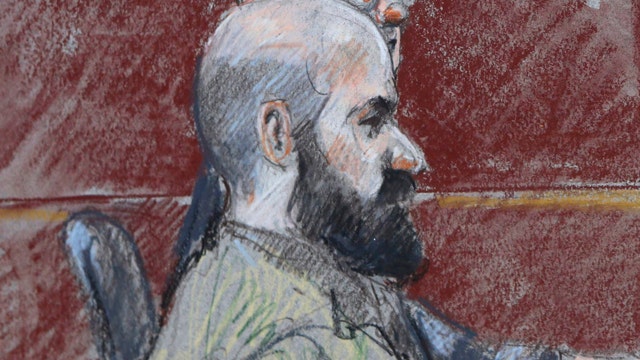Does Nidal Hasan want the death penalty?
Tamara Holder discusses the appeal filed by Hasan's lawyers over their frustration towards his apparent wish to be a mayrty
FBI agents took the stand Tuesday in the trial of a Army psychiatrist accused in the 2009 shooting rampage at Fort Hood, with one agent testifying the scene of the massacre was the "worst" he had seen.
The pace of Maj. Nidal Hasan's trial slowed as prosecutors shifted to forensic evidence, with FBI agents describing what they found at the medical building where the shootings occurred.
Brett Mills, an FBI firearms expert with 23 years on the job said he eventually found more than 270 bullet holes and bullet impacts.
“When I walked in there it was probably the worst scene personally that I’ve ever seen," he told jurors.
FBI Special Agent Susan Martin testified that she and other agents found so much evidence, including 146 shell casings and six magazines, that they ran out of numeric markers and had to use sticky notes.
"There were several bodies (in one area)," Martin testified. "There was medical equipment all over the floor. It was a pretty gruesome scene."
One juror wrote a note asking about security for the shooting scene. Kelley Jameson, the military police lead agent for the shooting, responded that it has been fenced with razor wire, locked and covered, and has been secure since the attack.
Jameson's testimony also suggested a specific reason for the date of the Nov. 5, 2009, attack: Hasan's soon-to-deploy units were due at the crowded building that day.
The jury, made of up military officers, also was shown a video taken during the initial walk through of the building and some crime scene photos. The photos were not displayed for the entire courtroom, which included journalists and victims' relatives in the gallery.
The judge, Col. Tara Osborn, also said she was not allowing prosecutors to show anyone the most graphic photos "that focus unnecessarily on the deceased."
Hasan, once again, asked no questions and raised no objections Tuesday. He was able to see the photos and the video, but he appeared to have no visible reaction.
Before the trial resumed for the day, officials at Fort Hood received a threatening phone call indicating that there may be a bomb at the construction site for a new hospital about a mile from the courthouse.
Authorities searched the site but no bomb was found.
Documents first reported on last week by Fox News described how Hasan told mental health experts after the attack that he "would still be a martyr" if convicted and executed by the government.
[pullquote]
Hasan told a panel of military mental health experts that he wished he had been killed in the attack, because it would have meant God had chosen him for martyrdom. The documents were part of a report that concluded Hasan was fit to stand trial.
Hasan was left paralyzed from the waist down after Fort Hood police officers ended the rampage by shooting him in the back.
"I'm paraplegic and could be in jail for the rest of my life," Hasan told a panel of military mental health experts, according to the documents. "However, if I died by lethal injection, I would still be a martyr."
The documents were released to the newspaper by John Galligan, Hasan's former civilian defense attorney. Galligan did not immediately return phone messages Tuesday.
Hasan, 42, is acting as his own attorney during the trial that began a week ago at Fort Hood.
But he has sat mostly silent as dozens of soldiers testified, many of them about being shot by Hasan's laser-sighted handgun. Others who escaped injury described in graphic detail how the terror unfolded on Nov. 5, 2009, inside a crowded building where soldiers were getting medical clearance for deployment.
His opening statement lasted last less than two minutes and he has raised few objections. That led his court-ordered standby attorneys to tell the judge overseeing the trial, Col. Tara Osborn, that they believe Hasan is deliberately mounting a defenseless strategy in hopes of being found guilty and receiving a death sentence.
Hasan has called those accusations a "twist of the facts." Nonetheless, Hasan is allowing his defense attorney to ask the Army Court of Criminal Appeals to either let them take over Hasan's case or further minimize their advisory roles.
Hasan's statements were contained in a 49-page report of a military panel known as a sanity board, according to the New York Times. That board concluded Hasan was fit to stand trial.
Galligan said Army prosecutors were given a summary of the report but had not seen these newly released pages, according to the newspaper. Galligan has previously released other documents at Hasan's request to Fox News.
Hasan told the panel he denied having remorse. He justified his actions by saying that the soldiers he killed were "going against the Islamic Empire," according to the Times.
"I don't think what I did was wrong because it was for the greater cause of helping my Muslim brothers," Hasan told the panel.
More than 60 witnesses have testified so far, and Hasan's decision not to cross-examine witnesses is expected to hasten the end of a trail that was originally expected to last at least a month.
The Associated Press contributed to this report


